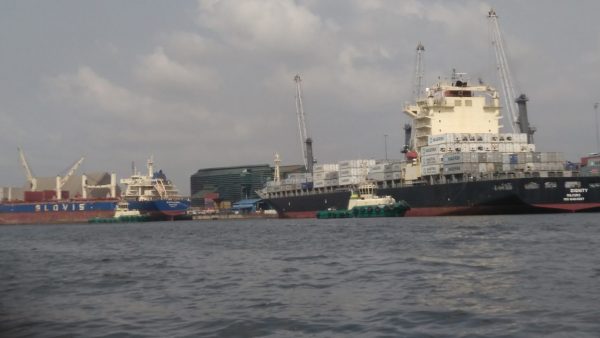Utilizing SLAC Trillions To Create A Maritime Development Bank
Nigerian Shippers’ Council’s (NSC) role as the ports economic regulator finally scaled through two weighty litigations against Seaports Terminal Operators Association of Nigeria (STOAN), and the shipping companies in separate judgments in January 2018, with both groups to refund over N11 trillion as Shipping Lines Agency Charges (SLAC) and other charges by terminal operators.
While the victory at the Appeal Court portends a light at the end of the tunnel for the embattled regulator, which has largely been perceived as a toothless bulldog over the years, terminal operators and shipping lines are plotting to drag the issue to the Supreme Court even as they continue to collect the SLAC from shippers, which in itself amounts to contempt of court.
Going by the recent judgments by the law court, the Council is set to receive up to N11trillion as refund expected to come from the terminal operators and the shipping companies as shipping companies are expected to pay about N4trillion, while the terminal operators are expected to pay about N7trillion.
However, the destination of these refund remain relatively unknown. Who should get these monies? These are duties paid by shippers and shippers have claimed rightfully that it would be inappropriate for the Federal Government to claim the fund. Nevertheless, it would also be an effort in futility to attempt to make the refund to the Shippers who deserve the fund based on their contribution.
Some stakeholders have posited that the monies be refunded to the Shippers’ Associations such as the Shippers Association Lagos State (SALS), but what happens to the independent shippers who do not align themselves to any association? What happens if the association eventually embezzles the fund without ensuring any form of development for shippers in the nation, another school of thought also asked?
Perhaps this money could be used to fund a Maritime Development Bank with preferential treatment given to shippers. The bank could enable shippers obtain loans with single digit interest rates such as 7% while other maritime stakeholders like ship-owners be allowed loans at slightly higher interest rate of 13%.
When operational, the bank will increase the purchasing power of shippers and also enable indigenous ship-owners acquire vessels to enable them to lift crude and refined petroleum products, thereby enhancing the nation’s Cabotage goals.
The Chinese economy continues to grow immensely and experts have attributed this to its specialized banking system. Little wonder the five largest banks in China are; Industrial and Commercial Bank of China (ICBC), China Construction Bank (CCB), Bank of China (BOC), Agricultural Bank of China (ABC) and the Bank of Communications (BCOM). Together these banks account for around one half of Chinese banking system assets and deposits. These banks are majority-owned by the Chinese state, but have private sector shareholders through their listings on the Hong Kong stock exchange.
Chinese have been successful because they have created specialized banks to care for various sectors of the economy with the banks understanding the unique characteristics and challenges of their various sectors.
Speaking to MMS Plus on this issue, the President of SALS, Rev. Jonathan Nicol endorsed the utilization of SLAC refund to create a specialized bank for the maritime sector where shippers are given access to loans at single digit interest rates.
“This is a great idea. However, I would suggest that we wait until we have received the money before we begin to discuss the best ways to utilize it. These shipping companies and terminal operators are not showing any remorse or willingness to pay the refund. They still collect SLAC from shippers despite the court ruling at the High Court and Court of Appeal that the charge is illegal”
“It is unfortunate that these foreigners behave this way. One expects them to have pleaded with the government via the Shippers’ Council to come to a roundtable to negotiate but they are keen to take the matter to the Supreme Court. With this development one can question the success of the port concession. We want everyone to be happy in this shipping industry even as everyone makes profit and the nation’s economy grows.” He added.
While the maritime sector celebrates the court victory over shipping companies and other stakeholders canvass the best ways to utilize the refund of these charges; it is surprising that some shipping companies like Maersk line are increasing their fees for SLAC.
Meanwhile on his part, the Publicity Secretary of Nigerian Indigenous Ship-owners Association (NISA) Engr. Emmanuel Ilori stressed that deploying the fund to establish a create a Maritime Development Bank will be a good idea especially at this critical stage where the Maritime Development Bank bill is making good progress at the national assembly.
“This would be a good idea now that the bill to establish the Maritime Development Bank is at the Senate. Recall that the House of Representatives, passed through second reading, a bill for an Act to establish the Nigerian Marine Development Bank last year” he said.
The bill which was sponsored by Hon. Mohammed Gololo (APC, Gombe), seeks to empower the bank to carry out the business of marine credit insurance and for other related funding intervention.
However, the Director General of Multimix Academy, Dr. Obiora Madu posited that there are several things to do with the trillions from SLAC in the maritime industry in order to improve the sector.
“There is decayed infrastructure which needs critical attention and the Shippers’ Council as the economic regulator of the port has so much to do to ensure that shipping thrives in the country. Look at the development of dry ports and Truck-Transit Parks (TTPs); we agree that private sector have to bring the funds but the private sector investors are scared of putting their money when a change in government administration could lead to a reversal in the concession or Public-Private Partnership (PPPs). The risk of policy inconsistency is enormous”, he said.
Dr. Obiora also expressed worry over the availability of such colossal funds to shipping companies and terminal operators even as he expressed skepticism over the willingness to disburse the fund.
“Are these operators ready and willing to make the refund? As it is now, I can’t imagine the terminal operators and shipping companies disbursing that sum without it affecting their survival. Such money could become handy in developing the port infrastructure and there is so much to do that the money may not be sufficient but it would go a long way” he stated.
However, Dr. Obiora admonished the maritime stakeholders to wait patiently until the money is available or probably after the Shippers’ Council gets the victory over these operators at the Supreme Court, before the debate on the best ways to utilize the refund begins.
“There has to be a template for the refund because these companies cannot refund the money spontaneously. The government wouldn’t shut-down these companies if they refuse to pay because even after such action the money wouldn’t automatically come to the government. So there is still a lot of diplomacy needed to resolve the problem. After the judgment the companies would have to make proposals on how they are capable of paying” he noted.
On his part the National Director, Chartered Institute of Logistics and Transport (CILT) Nigeria, Mr. Paul Ndibe suggested that the fund be channeled towards financing the transformation of Shippers’ Council into the National Transport Commission (NTC).
He argued that although the money was derived from shipping activities, the need to fund and float the National Transport Commission (NTC) is more pressing than the maritime sector which is a sub-sector of transport.
“If we devote that money only to maritime development it becomes a problem especially as the NTC which should be an umbrella body equally needs funding. The requisite funds for NTC may take a much longer time to arrive if we don’t channel the government’s attention to the opportunities of using this fund”, Ndibe said.
“Recall that the CVFF is also another fund for the development of Cabotage shipping services. We must ensure that people can access that fund and use it judiciously before advocating for something similar. Let us look at other areas where this fund can be channeled to which would benefit all sub-sectors of transportation in the nation” he added.
Copyright MMS Plus.
All rights reserved. This material, and other digital content on this website, may not be reproduced, published, broadcast, rewritten or redistributed in whole or in part without prior express written permission from KINGS COMMUNICATIONS LIMITED.









wonderful points altogether, you simply won a new reader.
What may you suggest in regards to your post
that you made a few days in the past? Any positive?